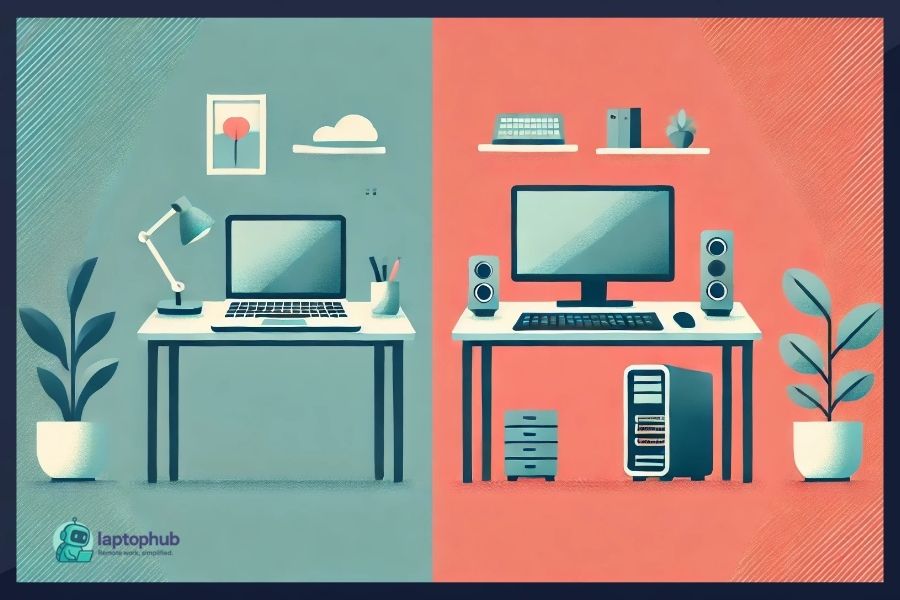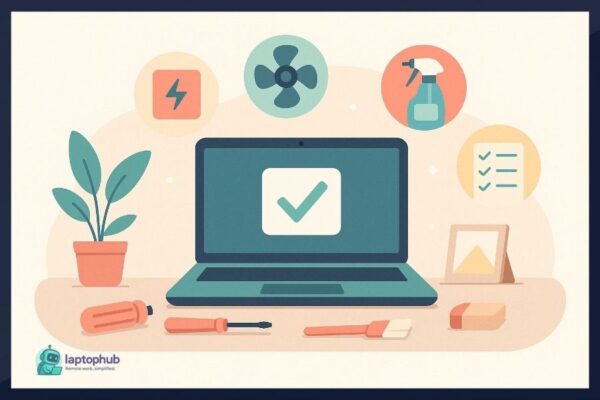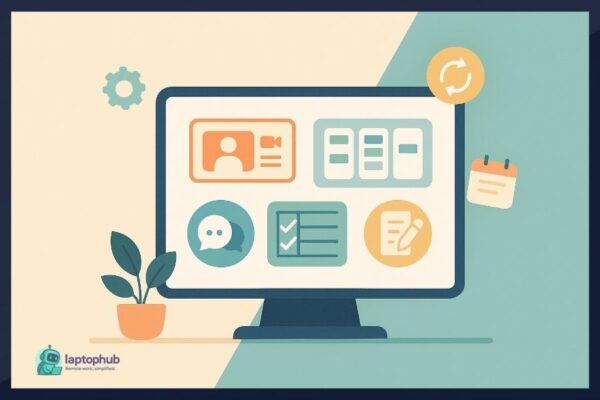You spend hours at your computer every day — it’s the nerve center of your work, your communication, and sometimes your sanity. So when it comes to building your home office, one decision matters more than most: laptop or desktop? The choice isn’t just about specs — it affects how you work, where you work, and how much you’ll spend over time. Whether you’re optimizing for performance, space, or flexibility, understanding the trade-offs between these two options is key to building a setup that actually supports your day-to-day life.
💡Key takeaways:
- Laptops offer portability and flexibility but sacrifice performance and upgrade potential.
- Desktops deliver better value, power, and long-term durability for stationary home office setups.
- Choosing the right device depends on your work style, space, budget, and comfort preferences.
- A hybrid setup can combine the best of both worlds: mobile convenience and desktop ergonomics.
Quick Overview: Laptop vs Desktop for Remote Work
| Feature | Laptop | Desktop |
|---|---|---|
| Portability | ✅ Mobile and flexible | ❌ Stationary setup |
| Performance | 🔄 Mid to high (varies by model) | ✅ Higher, better cooling |
| Price to Power Ratio | ❌ Less value for performance | ✅ Better hardware for the cost |
| Upgrade Options | ❌ Very limited | ✅ Highly customizable |
| Comfort | 🔄 Needs accessories | ✅ Optimized for long work sessions |
| Area | ✅ Saves space | ❌ Requires dedicated area |
Who You Are Determines What You Need
Let’s ground this in reality. Here’s how different user types should think about this choice:
Freelancer or Creative Professional
- Best pick: High-performance desktop
- Why: You’re editing videos, rendering graphics, or juggling huge files. You need power and room for upgrades.
Corporate Remote Worker
- Best pick: Laptop with a docking station
- Why: You may work from home, a coworking space, or while traveling. You need flexibility with office compatibility.
Parent or Casual Home Office User
- Best pick: Budget desktop or mid-range laptop
- Why: You need reliability, not max specs. Focus on comfort and cost-efficiency.
🖥️Also read: Home Office Lighting Tips for Better Focus and All-Day Energy
Performance Showdown: Speed, Multitasking, and Heavy Loads
Desktops typically offer more power for the same price as laptops, making them a smarter choice for users who need high performance. Forbes highlights that “a desktop of the same cost as a laptop will typically be more powerful.”
- Desktops excel at multi-core processing, GPU tasks, and heavy multitasking.
- Laptops throttle performance under heat due to size constraints.
- Gaming laptops or creator laptops can compete, but they come with premium price tags and are still limited in thermals.
Portability and Flexibility: How Often Do You Move?
If your workspace isn’t fixed — or you like working from the kitchen table in the morning and the patio in the afternoon — portability matters.
Laptops are:
- Easy to pack and carry
- Ideal for shared spaces
- Great for hybrid work or business travel
Desktops, on the other hand:
- Stay put
- Require a fixed spot
- Aren’t practical to move, even between rooms
Connectivity and Ports: Often Overlooked, Still Crucial
Modern laptops are slim, but they sacrifice ports. If you’re plugging in multiple monitors, an external hard drive, a mic, webcam, and phone charger — you’re going to need a USB hub or docking station.
Desktops have:
- Multiple USB ports (including USB-A and USB-C)
- HDMI, DisplayPort, and even Ethernet built-in
- More flexibility for legacy devices
Ergonomics: Can You Work Comfortably for 8+ Hours?
Laptops are terrible for posture unless you add:
- External monitor
- Laptop riser or stand
- External keyboard and mouse
Desktops make it easy to:
- Use a full-sized monitor at eye level
- Build a chair/desk setup that supports long workdays
- Create a true workstation that encourages better focus
Ergonomic fatigue is real, and if you’re working full-time, your body will thank you for going desktop — or at least investing in laptop accessories.
Upgradability and Repairs: Future-Proofing Your Setup
Laptops tend to last 3–5 years, while desktops can last 5–8 years with proper care and upgrades. Most of today’s laptop models have:
- Soldered RAM
- Non-replaceable batteries
- Limited SSD options
Desktops let you:
- Upgrade the graphics card
- Expand RAM
- Add storage
- Replace parts when they fail
That flexibility translates to longer usable lifespan and lower total cost of ownership.
Power Consumption and Noise
Laptops use up to 80% less electricity than desktops, making them more efficient and eco-friendly.
- More energy-efficient
- Quieter under normal use
- Easier on your electricity bill
Desktops:
- Can be noisier, especially with high-end GPUs
- Use more power, particularly for gaming or rendering
If you’re working in a quiet environment (like a shared home), noise can become a distraction. It’s something to consider.
Software and Operating System Compatibility
This is a niche issue but critical for some.
Desktops tend to have broader compatibility with:
- Older peripherals
- Legacy Windows software
- Niche business tools
Certain industries — CAD, architecture, scientific computing — may require a Windows-based, high-powered desktop to run specialized software.
Laptops, especially Macs or ultra-thin models, may run into issues with:
- Driver availability
- Storage capacity for enterprise applications
- Compatibility with enterprise-level security protocols
Real-World Hybrid Setup Tips
A popular approach is using a laptop as your main machine, then connecting it to:
- A 27” external monitor (or two)
- A mechanical or ergonomic keyboard
- A wireless mouse
- A USB-C or Thunderbolt dock
This gives you:
- A comfortable workstation at home
- The ability to undock and go mobile instantly
Laptop vs Desktop FAQs
What’s better for working from home: a laptop or a desktop?
If you value mobility and space-saving, a laptop is better. If you want top performance and long-term value, a desktop is the stronger choice.
Can I use both a laptop and a desktop for my home office?
Yes, many people use a laptop for mobility and connect it to a desktop-like setup (monitor, keyboard, etc.) at home for comfort and efficiency.
Which is more cost-effective: laptop or desktop?
Desktops generally offer better performance for the price and can be upgraded over time, making them more cost-effective in the long run.
Is a desktop or laptop better for Zoom meetings?
Laptops are convenient because they include webcams and mics, but desktops can offer higher quality with external accessories.
How do I make a laptop more comfortable for long work sessions?
Use a laptop stand, external keyboard, mouse, and a monitor to improve posture and avoid fatigue.
Final thoughts
Choosing between a laptop and a desktop for your home office isn’t just about specs — it’s about how you work, where you work, and what you plan to do in the next 2–3 years.
If flexibility matters more than raw power, go with a laptop and build a strong hybrid workstation. If performance, comfort, and future-proofing matter more, invest in a desktop that you can upgrade as your needs evolve.



